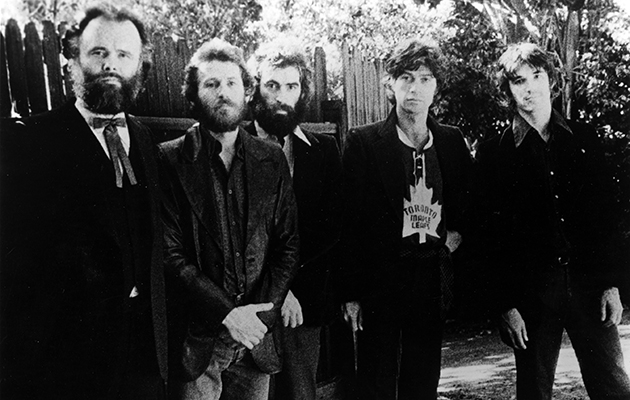Music From Big Pink performed only modestly when it was released in July 1968, reaching the Top 30 in the US, while “The Weight” got to No 21 in the UK. Capitol hyped the various angles of the Dylan connection, but it was a slow burn. There was some confusion with their name, which seemed hardly to be a name at all. On their record contract they had called themselves The Crackers, a throwaway joke that made it on to some early acetates.
The sense of mystery, even confusion, was intrinsic. Some of it was planned. The cover art was an oblique painting by Dylan, with a photo of Big Pink on the back [see panel]. The black and white band photo could have been taken anytime in the past century and was not captioned. Similarly, the brief notes provided no information about what each band member did. “No-one had any idea who was singing what and it didn’t matter at all,” says Joe Boyd, who was working at the time with a number of British folk bands, including Fairport Convention. “It was just ‘the band’.”
Happenstance also played its part. Having planned to tour the album, Danko broke his neck in a car accident – in his own words, “a little too drunk, a little too high” – and so their live debut was postponed. Instead, they hunkered down in Woodstock and the mystique grew. “People were like, ‘What are they doing up in those mountains?’” says Robertson. “Nobody quite knew what to make of it.”
Al Kooper, the keyboard player who had performed with members of The Hawks backing Dylan, wrote the first major review of the record for Rolling Stone. “It couldn’t have been more unexpected based on The Hawks’ previous discography,” he says. “No-one thought they were capable of making this kind of record.”
The most profound impact was felt by fellow musicians. Music From Big Pink was so extraordinarily, immediately potent it actually hastened the demise of other groups. Eric Clapton heard a pre-release tape and almost instantly decided to call time on Cream. An awestruck George Harrison became even more determined to leave The Beatles, but before he did, on songs like “Don’t Let Me Down”, the Fabs had a stab at being The Band.
“I just recently got a message from Donald Fagen,” Robertson laughs. “He was listening to Let It Be… Naked and he said, ‘Oh my God, were these guys ever influenced by The Band?’”
Them and everybody else. Even the flagbearers of West Coast psychedelic rock, the Grateful Dead, heard Big Pink and detoured into a more rootsy style, with lyricist Robert Hunter expanding on Robertson’s fascination with American mythology. Elton John’s obsession with The Band is all over his early LPs. Joe Boyd recalls that Big Pink hit the UK scene “like a ton of bricks. It was an unexpected, perfect bridge between the working-class roadhouse music of the South and the folkies studying American roots music like a thesis.”
What was so compelling? Richard Thompson told Uncut: “We loved the rootsiness. They seamlessly blended Americana styles – blues, country, rock, R’n’B, Appalachian – and regurgitated it all with their own unique sound. I think there was considerable cultural impact for us too. These guys had short hair and suits, totally against the fashions and styles of the day.” That “rootsiness” was significant. Moving the focus from the city to the country spoke also of a willingness to embrace the past. Numerous musicians, from a variety of genres, picked up on the notion of exploring their own sense of history and tradition. Says Boyd: “My belief is that Big Pink guided Fairport away from ‘American’ music as they had been doing and forced them to create something as ‘British’ as Big Pink was ‘American’.”
The unhurried pace, too, was new in rock. The slow roll of “The Weight” and dragging drama of “Tears Of Rage” and “Chest Fever” were formative in progressive rock, an unlikely inspiration for, among others, Pink Floyd.
“That one record changed everything for me,” Roger Waters told the Dallas Morning News in 2008. “After Sgt Pepper, it’s the most influential record in the history of rock’n’roll. It affected Pink Floyd deeply, deeply, deeply. Philosophically, other albums may have been more important, like Lennon’s first solo album. But sonically, the way the record’s constructed, I think Music From Big Pink is fundamental to everything that happened after it.”
It has gone on changing the musical weather ever since. Its fusion of down-home styles and lack of flash was intrinsic to the British pub-rock scene of the ’70s. REM – a democratic, instrument-swapping, triple-harmony threat – perhaps got closest to evolving The Band’s many-hued music. Countless others have tried. In particular, the group ethic, the harmonies, the vivid sense of history and place, the lack of virtuoso flash, the palpable emotion – for all the joy of its creation, this was often heartbroken music – were all catalysts for the Americana movement. “I recently heard a cut by Wilco on the radio,” says John Simon. “The Band influence was obvious.”
It’s hard to think of another record that has been more influential, yet which remains so essentially unique and indefinable. “Big Pink became its own category,” says Al Kooper. “People still say about other bands, ‘That sorta sounds like The Band,’ and I always reply, ‘Yeah, sorta!’ But no-one else has ever had the writing, arrangement or similar vocal prowess to really compete with it.”
According to Robertson, the key to its enduring success is simple. “It was just fun,” he says. “We had lots of laughs. When I think about it now, it’s really the way music-making should be.”
The History Of Rock – a brand new monthly magazine from the makers of Uncut – a brand new monthly magazine from the makers of Uncut – is now on sale in the UK. Click here for more details.
Uncut: the spiritual home of great rock music.



